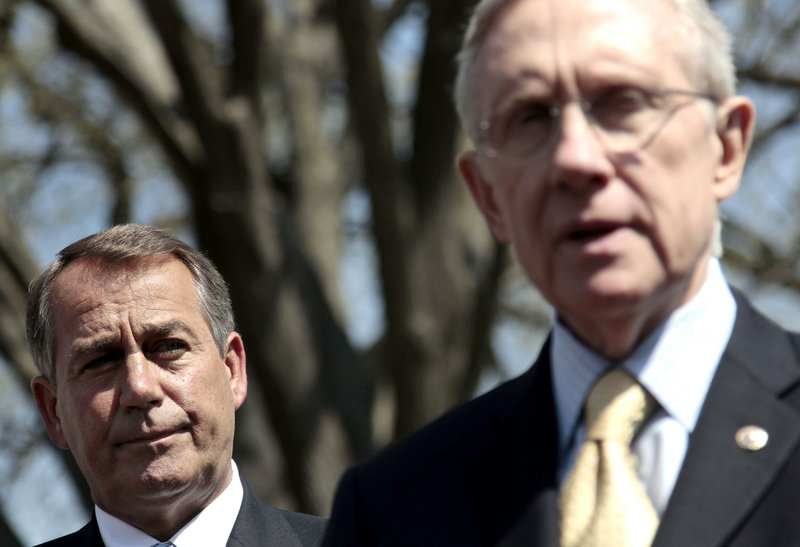WASHINGTON – Republicans and Democrats on Capitol Hill say they are about $5 billion apart in their haggling to reach a deal to fund the federal government for the rest of the year.
That represents a minuscule percentage of the trillion dollars in spending Congress doles out each year.
Yet weeks of negotiations have not led them to an agreement. A flurry of activity Thursday, including two Oval Office sit-downs with President Obama, did not close the gap, or even cool the rhetoric. Each side continued to accuse the other of playing politics, and of trying to force a government impasse.
And the question on the minds of many in the capital — Will a shutdown happen? — is now being asked with increasing urgency. If the two sides cannot come to terms by midnight today, Washington will effectively run out of money and the government will close.
With no deal in sight, agencies began preparing more than 800,000 federal workers nationwide for that possibility, letting them know whether they should show up for work on Monday morning if a shutdown occurs.
There appeared to be a disconnect Thursday between the overheated gamesmanship that took place in front of the cameras and the calmer negotiations occurring out of view.
House Speaker John Boehner, R-Ohio, pushed for a deal that would include about $39 billion in spending cuts. Senate Majority Leader Harry Reid, D-Nev., and Obama have pushed to keep the reductions to about $34 billion, aides in both parties said.
But aides privately said that disagreements about money are no longer really the issue. Negotiators have identified an array of spending cuts, enough to meet Boehner’s and Reid’s demands — if they can agree on which of those cuts to make.
Publicly, Boehner and Reid continue to argue over Republican demands that any deal include restrictions on abortion funding and environmental regulations. Democrats oppose them. Privately, both sides acknowledge that these may turn out to be bargaining chips that the GOP will ultimately remove from a final agreement in exchange for deeper cuts or other concessions.
At this point, the details don’t seem to be the obstacle. Instead, it has come down to a test of political will between Boehner on one side and Reid and Obama on the other.
Neither side wants to be perceived as the one that caved. And both sides seem to think that if a deal can ultimately be struck, there is advantage to be gained by waiting until the last minute to strike it.
Democrats and Republicans are both eager to move past this argument and get to other disagreements with far greater impact, including debates over whether to allow the U.S. Treasury to borrow money beyond the current $14.3 trillion debt limit and over the GOP’s ambitious proposed budget for 2012.
Congressional leaders consider the current talks a dry run for the battles to come.
“It’s taken us some time to get acquainted with each other and to work our way through this, because — understand that this process that we’re in is likely to be repeated a number of times this year,” Boehner told reporters Thursday. “I think everyone is taking their time, trying to get this right.”
It was difficult to tell whether the two sides were truly at odds or making it seem so in preparation for a grand compromise. At one point Thursday afternoon, a grim-faced Reid told his fellow Democratic senators to steel themselves for a shutdown.
Across the Capitol, Reid’s top aide was in Boehner’s office looking for areas of agreement with Republicans.
Even if the two sides reach a deal, they will still have a problem: There almost certainly isn’t enough time to move a spending bill through the House and Senate before the Friday deadline. To keep the government open, they must approve yet another stopgap measure — the seventh since fall — to keep the government running into next week and buy more time for negotiations.
House Republicans approved a one-week extension Thursday that includes full funding for the Defense Department as well as $12 billion in cuts to other agencies.
They called it a “troop funding bill,” and 232 Republicans and 15 Democrats supported it.
But the measure had no chance of passing the Democratic-controlled Senate, in part because it contained a restriction on funding for abortions in the District of Columbia that Democrats oppose. Obama said he would veto the legislation.
That came as no surprise to Boehner, who introduced the measure as a way to rally Republicans — and to blame Democrats who voted against it if an impasse occurs.
Reid tried to turn that maneuver back on Republicans. He made plans to offer an amended Senate version of the House’s one-week extension. If Senate Republicans filibuster the bill, and the government shuts down, Democrats will be able to blame the GOP.
Away from the theatrics, the talks continued. Reid and Boehner trooped back to the White House on Thursday night for a third meeting with Obama. About 24 hours earlier, after their first broke up, the leaders’ top staff members remained behind in the West Wing into the early morning.
They hit an impasse, aides said, over the mix of the spending cuts and policy provisions — called “riders” — to include.
Send questions/comments to the editors.


